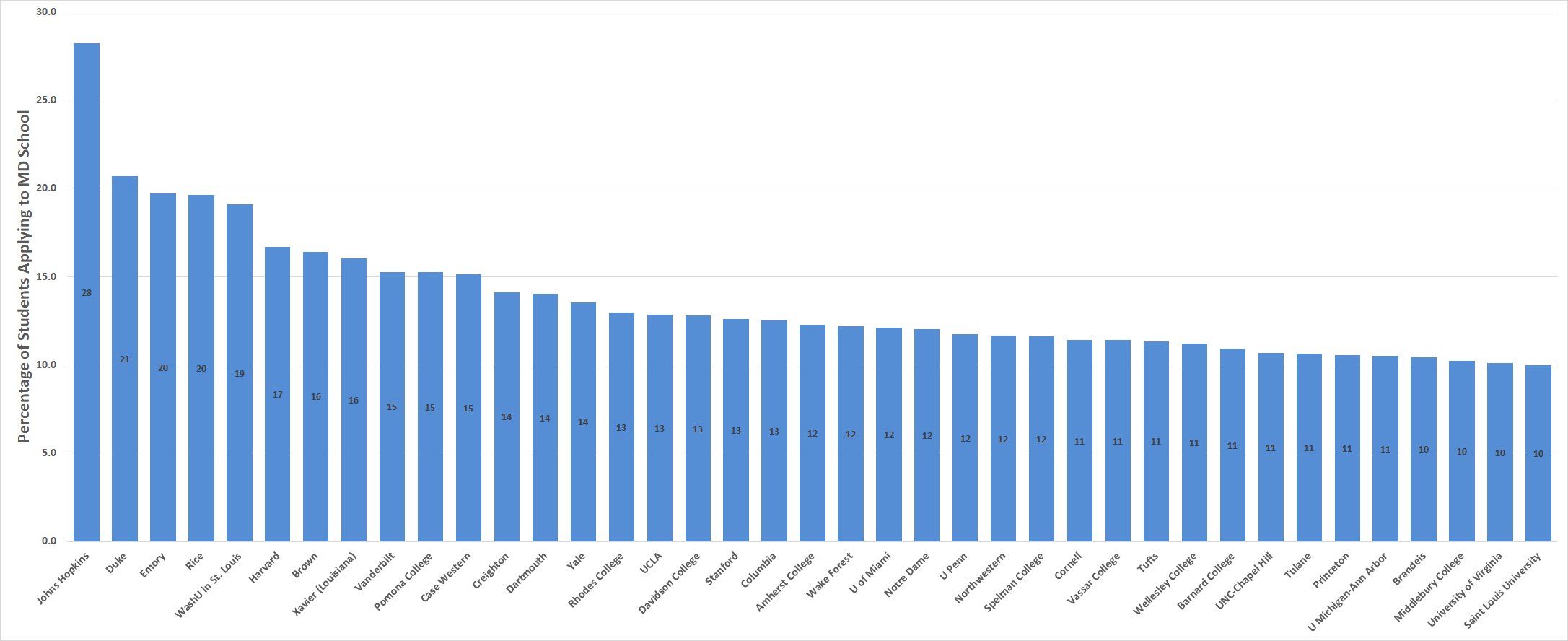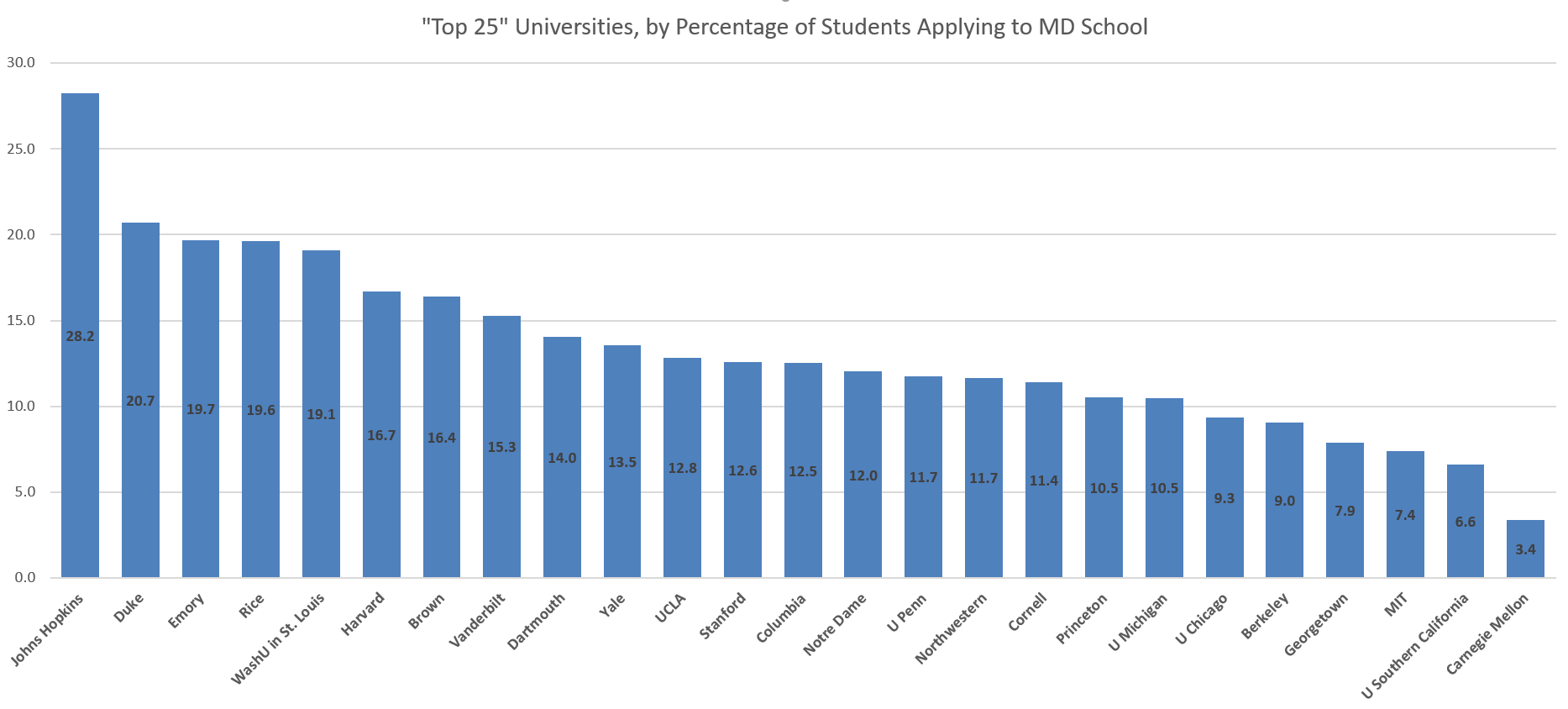- Joined
- Apr 6, 2014
- Messages
- 14,146
- Reaction score
- 22,778
Hey all,
College acceptance season is nigh. Type A high schoolers with an interest in biomed will soon, if they haven't already, begin flocking to SDN to begin planning the rest of their life. One question they may be asking themselves as they decide between similar universities or librul arts colleges may be, "is one of these options stronger in pre-med?"
Back in 2014, and again in 2016, I ran some quick analyses of which undergraduate institutions churn out the highest numbers of premeds per capita - in other words, which schools had the largest proportion of their students applying to medical schools.
Here for another update: the Most Premedical Universities, 2019-2020 Edition.
Total applicants from each institution was taken from the AAMC FACTS Table A-2, and undergraduate enrollment values and "top 25 rank" status both from US News 2019-2020.
The 10 schools with the highest % of graduates applying to MD Schools in 2019-2020:
1. Johns Hopkins - 28.2% (wow!)
2. Duke - 20.7%
3. Emory - 19.7%
4. Rice - 19.6%
5. WashU - 19.1%
6. Harvard - 16.7%
7. Brown - 16.4%
8. Xavier - 16.0%
9. Vanderbilt - 15.3%
10. Pomona - 15.2%
Here is a chart displaying all colleges and universities for which 10% or greater applied to MD schools:

One of the things that jumps out right away is that the "top ranked" universities are almost all represented. However, there are some notable exceptions and a lot of distance between the extremes. Even schools with very similar admissions stats can differ a great deal. For example, a student choosing between Duke and U Chicago would have more than double as many premed classmates at the former.
Here is a bonus chart displaying only the "Top 25" colleges by their medical applicant percentages:

Clearly, the caliber of the student body isn't the only driving factor for these numbers - some institutions either admit or enroll more premeds, or better foster the premed pathway. Comparing to the similar charts 4-6 years ago, it's the same set of usual suspects that are churning out the greatest proportion every year.
College acceptance season is nigh. Type A high schoolers with an interest in biomed will soon, if they haven't already, begin flocking to SDN to begin planning the rest of their life. One question they may be asking themselves as they decide between similar universities or librul arts colleges may be, "is one of these options stronger in pre-med?"
Back in 2014, and again in 2016, I ran some quick analyses of which undergraduate institutions churn out the highest numbers of premeds per capita - in other words, which schools had the largest proportion of their students applying to medical schools.
Here for another update: the Most Premedical Universities, 2019-2020 Edition.
Total applicants from each institution was taken from the AAMC FACTS Table A-2, and undergraduate enrollment values and "top 25 rank" status both from US News 2019-2020.
The 10 schools with the highest % of graduates applying to MD Schools in 2019-2020:
1. Johns Hopkins - 28.2% (wow!)
2. Duke - 20.7%
3. Emory - 19.7%
4. Rice - 19.6%
5. WashU - 19.1%
6. Harvard - 16.7%
7. Brown - 16.4%
8. Xavier - 16.0%
9. Vanderbilt - 15.3%
10. Pomona - 15.2%
Here is a chart displaying all colleges and universities for which 10% or greater applied to MD schools:

One of the things that jumps out right away is that the "top ranked" universities are almost all represented. However, there are some notable exceptions and a lot of distance between the extremes. Even schools with very similar admissions stats can differ a great deal. For example, a student choosing between Duke and U Chicago would have more than double as many premed classmates at the former.
Here is a bonus chart displaying only the "Top 25" colleges by their medical applicant percentages:

Clearly, the caliber of the student body isn't the only driving factor for these numbers - some institutions either admit or enroll more premeds, or better foster the premed pathway. Comparing to the similar charts 4-6 years ago, it's the same set of usual suspects that are churning out the greatest proportion every year.
